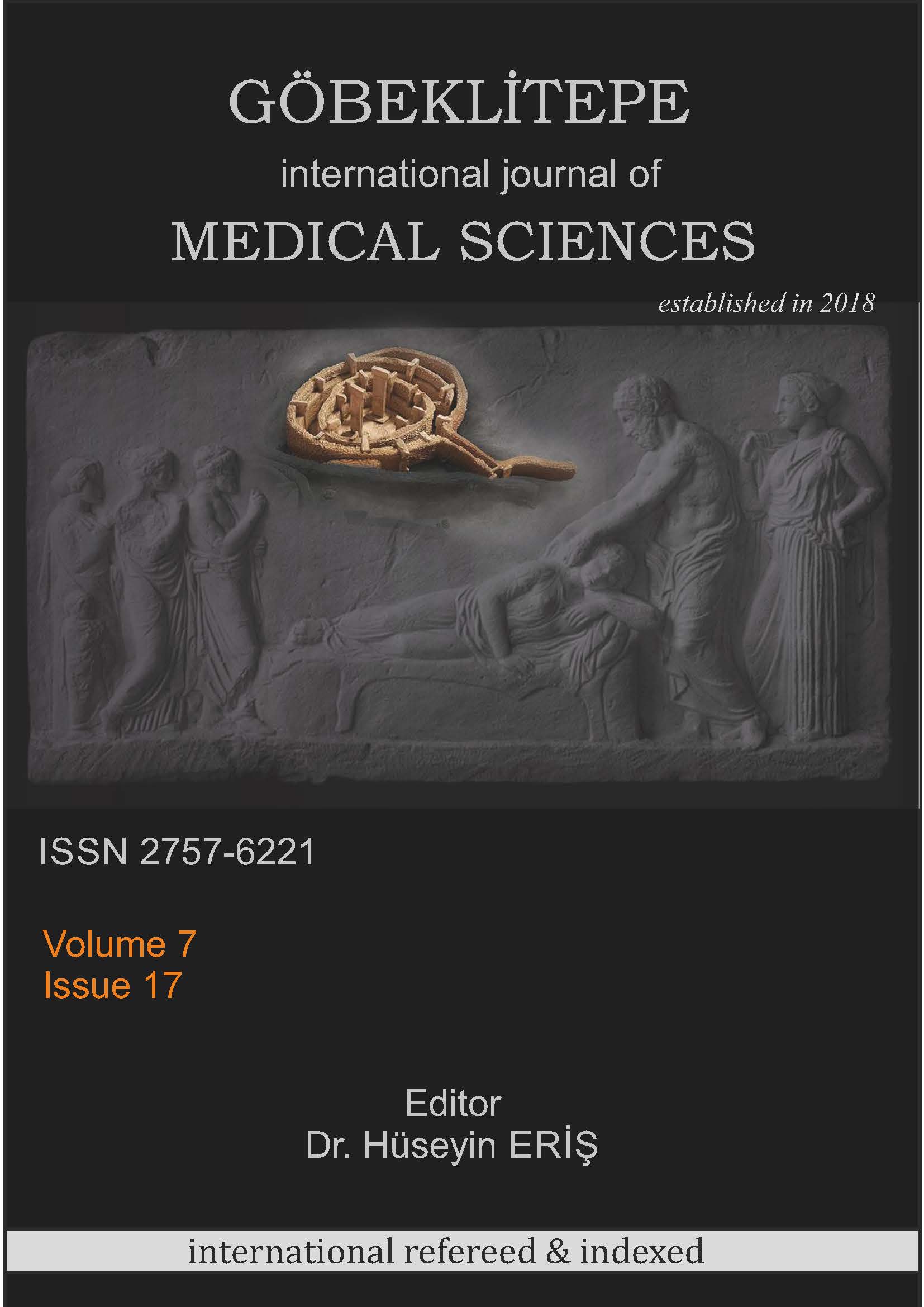DEPREM SONRASI HEMŞİRELİK ÖĞRENCİLERİNDE TRAVMA SONRASI STRES BOZUKLUĞU VE ACI İLE YÜZLEŞME
Anahtar Kelimeler:
Deprem, Hemşirelik Öğrencisi, Acı, Travma Sonrası Stres BozukluğuÖzet
Bu çalışma, depremin hemşirelik öğrencileri üzerindeki psikolojik ve duygusal sonuçlarını araştırmaktadır. Bu çalışmada, depremin Türkiye'deki hemşirelik öğrencileri üzerindeki deneyimlerini ve psikolojik etkilerini araştırmak için nitel derinlemesine görüşmeler ve nicel anketlerden oluşan karma bir araştırma tasarımı kullanılmıştır. Temsili bir örneklem sağlamak için tabakalı örnekleme kullanılmıştır. Çalışma evreni, Kahramanmaraş'ta depremden ciddi şekilde etkilenen 39 hemşirelik öğrencisinden oluşmaktadır. Nitel görüşmeler öğrencilerin kişisel bakış açılarını ve baş etme mekanizmalarını yakalamayı amaçlarken, nicel anketler standartlaştırılmış bir ölçek kullanarak deprem sonrası travma düzeyini ölçmüştür. Veriler Haziran ve Ağustos 2023 tarihleri arasında yüz yüze görüşmeler yoluyla toplanmış olup nitel verilerin analizinde içerik analizi, nicel verilerin analizinde ise betimsel istatistikler kullanılmıştır. Çalışmanın sonuçları, depremi yaşayan hemşirelik öğrencileri üzerinde önemli psikolojik ve duygusal etkiler olduğunu ortaya koymuştur. Katılımcılar anksiyete, stres ve travma sonrası stres bozukluğu gibi çeşitli semptomlar bildirmişlerdir. Bulgular ayrıca, depremin öğrencilerin refahı üzerindeki olumsuz etkilerini hafifletmede sosyal destek ve başa çıkma mekanizmalarının önemini vurgulamıştır. Bu çalışma, depremin hemşirelik öğrencileri üzerindeki psikolojik etkilerine ilişkin değerli bilgiler sunmaktadır. Eğitim kurumları ve politika yapıcılar, hemşirelik öğrencilerinin ruh sağlığı ihtiyaçlarını ele alarak, afetler karşısında dirençli ve gelişen bir akademik topluluğu teşvik edebilirler.
Referanslar
Watkins, L.E., Sprang, K.R., Rothbaum, B.O. (2018). Treating PTSD: A review of evidence-based psychotherapy interventions. Frontiers in behavioral neuroscience, 12, 258.
Liang, Y., Cheng, J., Ruzek, J.I., Liu, Z. (2019). Posttraumatic stress disorder following the 2008 Wenchuan earthquake: A 10-year systematic review among highly exposed populations in China. Journal of affective disorders, 243, 327-39.
Tanrıkulu, A.B., Kaya, H., Örüm, M.H., Akyıldırım, S. (2023). Prevalence and determinants of post-traumatic stress disorder in patients with schizophrenia 2 years after an earthquake in Turkey. The International Journal of Psychiatry in Medicine, 00912174231180467.
Sharma, R., Tamang, N.D., Bhattarai, G. (2023). Assessing Prevalence of Post-Traumatic Stress Disorder Symptoms Following the 2015 Earthquake in Langtang, Nepal. BJPsych Open, 9(1), 71-P.
Karamustafalıoğlu, O.K., Fostick, L., Çevik, M., Zukerman, G., Tankaya, O., Güveli, M., et al. (2023). Ten-year follow-up of earthquake survivors: long-term study on the course of PTSD following a natural disaster. The Journal of clinical psychiatry, 84(2), 45763.
Karamustafalioglu, O. (2004). Evaluation of the effects of psychological trauma after an earthquake in Istanbul. Oral Presentation at 3rd Trauma Meetings, Istanbul.
Utkucu, M., Uzunca, F., Durmuş, H., Nalbant, S., Sert, S. (2023). The 2023 Pazarcik (Mw= 7.8) and Elbistan (Mw= 7.6), Kahramanmaraş Earthquakes in The Southeast Turkey. Disaster Management Application and Research Center and Department of Geophysics, Sakarya University, 22.
Öztekin, S.D., Larson, E.E., Yüksel, S., Altun Uğraş, G. (2015). Undergraduate nursing students' perceptions about disaster preparedness and response in Istanbul, Turkey, and Miyazaki, Japan: A cross-sectional study. Japan Journal of Nursing Science, 12(2), 145-53.
Ceyhan, E., Ceyhan, A.A. (2007). Earthquake survivors' quality of life and academic achievement six years after the earthquakes in Marmara, Turkey. Disasters, 31(4), 516-29.
Seren, A.K.H., Dikeç, G. (2023). The earthquakes in Turkey and their effects on nursing and community health. International nursing review, 70(3), 262-5.
Kocoglu, E., Demir, F.B., Öteles, Ü.U., Özeren, E. (2023). Post-Earthquake Trauma Levels of University Students Evaluation: Example of 6 February Kahramanmaras Earthquake. Higher Education Studies, 13(2), 121-7.
Kaplan, T., Keser, İ. (2021). The Relationship Between Nursing Students' Beliefs About the Transformative Power of Pain and Their Empathy Skills. Journal of Academic Research in Nursing (JAREN), 7(3).
Sönmez, M.O., Nazik, F., Pehlivan, E. (2019). Prevalence of post-traumatic stress disorder in university students after the Van earthquake. Peer Reviewed International, 23 (3), 957-972.
Tanhan, F., Kayri, M. (2013). Validity and reliability study of the post-earthquake trauma level determination scale. Educational Sciences in Theory and Practice, 13(2), 1013-25.
Chen, H., Feng, L., Shen, W.W., Guo, H.X. (2009). A study on the psychological state of nurse-students of a university in affected areas of Wenchuan earthquake. Hu li za zhi The journal of nursing, 56(5), 30-8.
Komatsu, M. (2020). The Results of the Japan-US Joint Disaster Nursing Training Program for nursing students with experience of the Great East Japan Earthquake. Journal of allied health sciences, 11(2), 108-120.
Longo, B.M. (2022). Earthquake preparedness and knowledge of recommended self-protective actions: A survey of nursing students. Disaster medicine and public health preparedness, 16(2), 495-9.
Rahayu, R., Khoiriyati, A. (2019). Earthquake Preparedness Among Nursing Students. IJNP (Indonesian Journal of Nursing Practices), 3(2), 67-74.
Trip, H., Tabakakis, K., Maskill, V., Richardson, S., Dolan, B., Josland, H., et al. (2018). Psychological health and resilience: the impact of significant earthquake events on tertiary level professional students. A cross-sectional study. Contemporary nurse, 54(3), 319-32.
Duruel, M. (2023). The Role of Non-Governmental Organizations in Disaster Management: February 6 Earthquake Hatay Example. International Journal of Political Studies, 9(2), 1-18.
Li, Y., Turale, S., Stone, T.E., Petrini, M. (2015). A grounded theory study of ‘turning into a strong nurse’: earthquake experiences and perspectives on disaster nursing education. Nurse education today, 35(9), e43-e9.
Nukui, H., Midorikawa, S., Murakami, M., Maeda, M., Ohtsuru, A. (2018). Mental health of nurses after the Fukushima complex disaster: a narrative review. Journal of radiation research, 59(suppl_2), ii108-ii13.
Sumıyama, Y., Yamauchı, M., Fuji, N., Aoyama, M., Kobayashi, C., Ikeda, T. (2020). Volunteer activities and lessons learned by graduate nursing students following the 2016 Kumamoto earthquake. Health Emergency and Disaster Nursing, 7(1), 63-8.
Johal, S.S., Mounsey, Z., Brannelly, P., Johnston, D.M. (2016). Nurse perspectives on the practical, emotional, and professional impacts of living and working in post-earthquake Canterbury, New Zealand. Prehospital and Disaster Medicine, 31(1), 10-6.
Moradi, K., Abdi, A., Valiee, S., Rezaei, S.A. (2020). Nurses' experience of providing ethical care following an earthquake: a phenomenological study. Nursing ethics, 27(4), 911-23.
Yıldız, M.İ., Başterzi, A.D., Yıldırım, E.A., Yüksel, Ş., Aker, A.T., Semerci, B., et al. (2023). Preventive and therapeutic mental health care after the earthquake-expert opinion from the psychiatric association of Turkey 2.
Çağıran, Z., Sertöz, N., Karaman, S., Özen, D., Demirkoparan, M., Uyar, M., et al. (2023). Our clinical experiences in the earthquake victims who came to our university after the 2020 Aegean Sea earthquake during the COVID-19 pandemic. Turkish Journal of Trauma & Emergency Surgery, 29(3), 310.
İndir
Yayınlanmış
Sürüm
- 2024-10-24 (2)
- 2024-09-30 (1)
Nasıl Atıf Yapılır
Sayı
Bölüm
Lisans
Telif Hakkı (c) 2024 Göbeklitepe Sağlık Bilimleri Dergisi

Bu çalışma Creative Commons Attribution 4.0 International License ile lisanslanmıştır.




